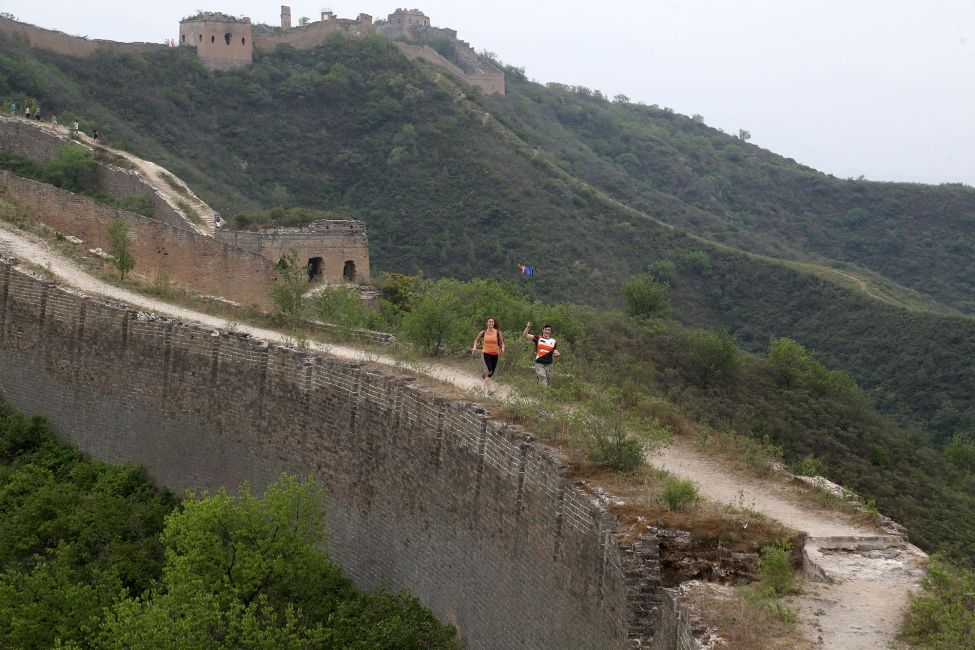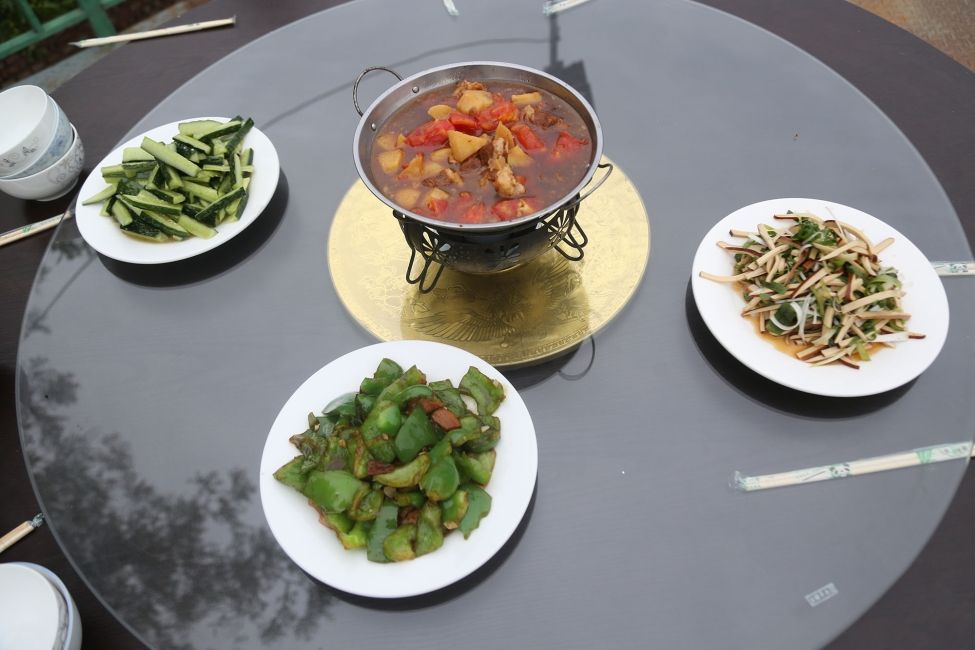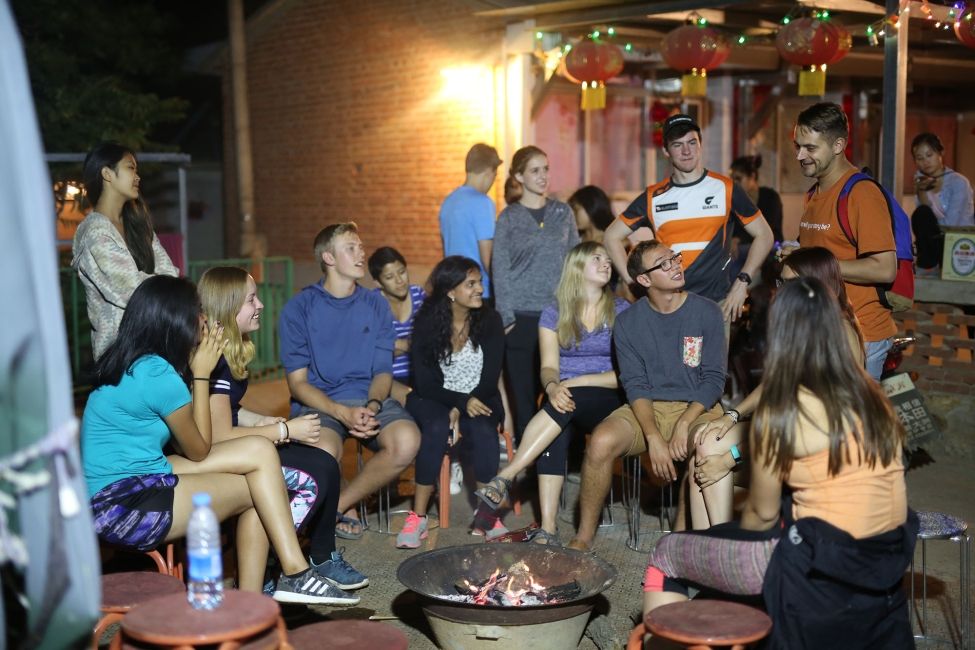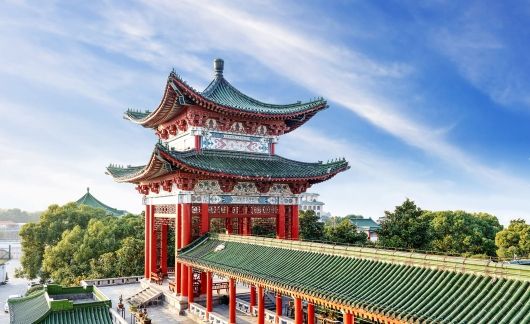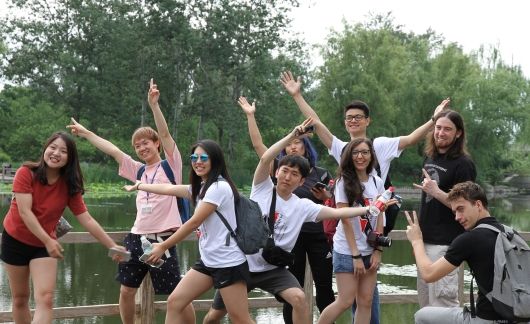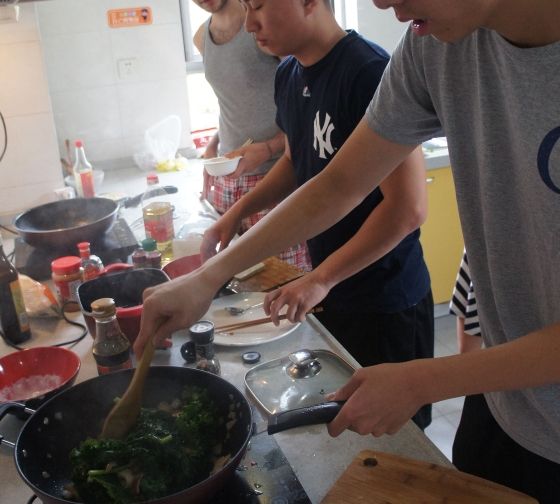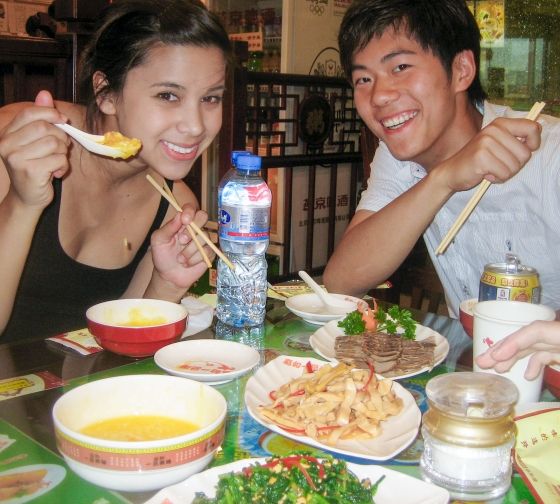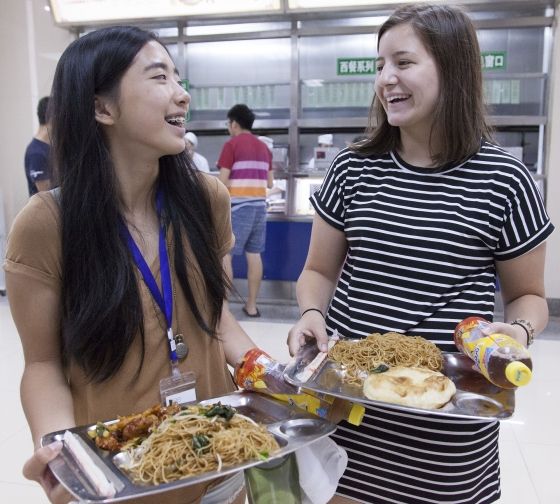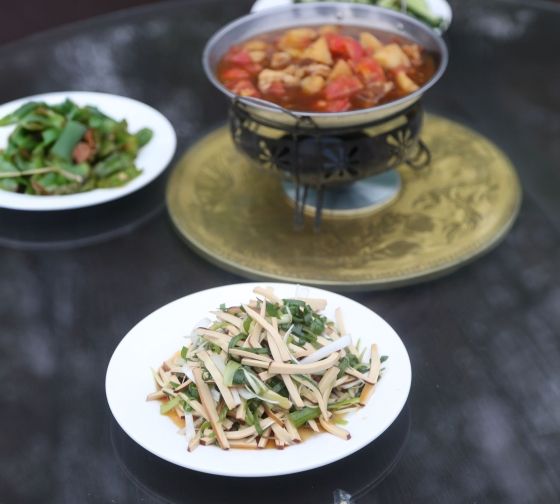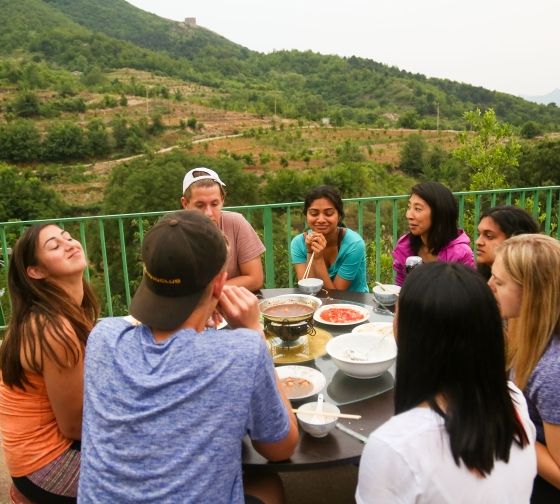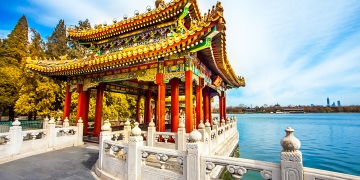
Advanced Chinese Studies
Program not currently active. Please check out other programs in the region
Unique Experiences
CHALLENGE YOURSELF AT PRESTIGIOUS PEKING UNIVERSITY
with courses at the School of International Studies, the Guanghua School of Management, and many more.
EXPLORE THIS VAST COUNTRY
with two unforgettable long weekend excursions, one preset, and one you choose.
TAKE YOUR CHINESE LANGUAGE SKILLS
to a professional level with one-on-one tutorials and special meals.
6
UNESCO WORLD HERITAGE SITES
60,000
RESTAURANTS
91
UNIVERSITIES
Your Destination
With a population of 22 million and counting, people from all over China and the world have flocked to this cultural center as China’s economy and international power have grown. A fascinating blend of the very old and the ultra-modern, Beijing is home to 15th- century treasures like the Hall of Supreme Harmony and stunners like National Stadium, a.k.a. the Bird’s Nest. The jam-packed cosmopolitan city buzzes with a lively arts scene and is home to a record number of top research institutions and technology companies. This program is perfect for anyone looking for deep immersion into Chinese culture and a challenging yet rewarding academic experience at a top university.
CIEE wants all our students to feel welcomed, supported, and empowered to succeed while studying abroad. Local CIEE staff have provided details about conditions and cultural attitudes that students with specific identities might encounter in Beijing.
The Culture
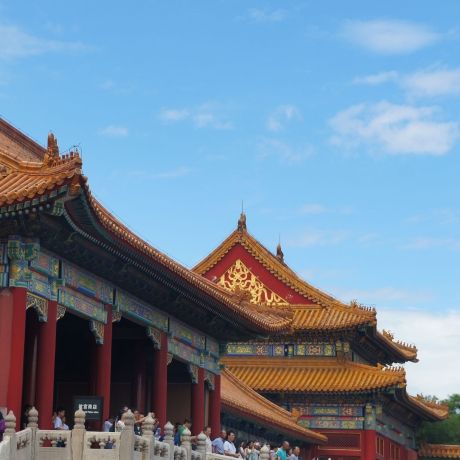
EXCURSIONS & ACTIVITIES
- Visit amazing sites loaded with history, like Tiananmen Square and the Forbidden City.
- Take a long weekend away to an alluring destination like Xi’an, Hangzhou, or Nanjing.
- Load up on culture with plays, rock music performances, art exhibitions, and more.
- Try something new like a class in calligraphy, painting, seal carving, or martial arts.
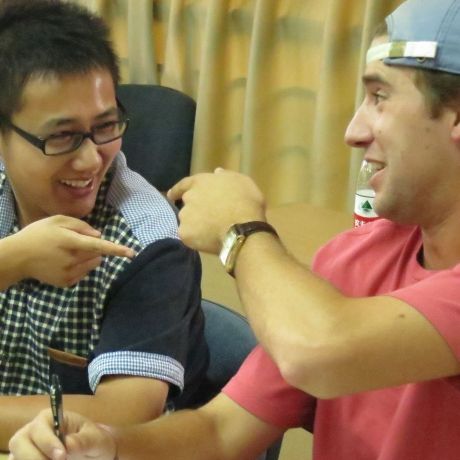
PROJECTS
- Peer Tutor program. CIEE students are paired with local students from the PKU department in which the CIEE student is enrolled. These tutorials provide students with guided support in academic writing and research in a Chinese context, which is integrated into the required CIEE core course, Tutorial for Advanced Research and Writing. They also provide students extra help and practice in Chinese and guidance with homework assignments, while giving students an opportunity to befriend a Chinese peer.
- Target language meals. To encourage students to use improving Chinese, CIEE periodically arranges for students to share meals with tutors or Chinese friends and instructors.
- Volunteering. Connect with Chinese people and give back. Share meals and crafts with autistic children or teach English at a school for blind children.
Program Blogs
Top 6 Chinese Language Study Abroad Programs
Are you fascinated by Chinese language and culture? If so, you’re in the right place! Read on as we list our Top 6 Chinese language study abroad programs: Chinese Language... keep reading
Now is the time to think about coming to Beijing!
Explore Beijing's rich cultural tapestry, blending tradition and modernity. Experience historic sites like the Forbidden City, embrace nature in parks and hills, and savor diverse culinary delights. Amid global reopening, China invites students to contribute to global connections while enjoying the city's vibrancy.
EAT, DRINK, EXPLORE: BEIJING
EAT Peking duck ( shāo yāzi) has been eaten in Beijing since the Imperial Era and is the city’s most famous dish to date. The meat is characterized by its... keep reading
HOUSING & MEALS
HOUSING
CIEE Beijing offers exciting housing options, including homestays and residence halls. All housing options are located in neighborhoods with convenient access to campus.
Standard Housing: Includes a single room at a homestay or suite-style units at PKU. Homestays boast a kitchen, living room, and bathroom shared with a host family, within a 45-minute commute of campus. Homestays are ideal for students who want to live in a Chinese language environment and make rapid progress in learning the Chinese language and cultural study. Residence Halls are located in Zhongguanyuan Global Village at PKU. Each student has a private bedroom with Internet access and shared living space, kitchens, and a bathroom with one or two roommates (CIEE students or other international students).
MEALS
Homestays: Students are invited to family meals about four times during the week, and should budget for other meals, including lunch on campus.
Residence halls: Meals are not included. Students typically eat at student cafeterias or at inexpensive restaurants on and around campus.
Academics
The Advanced Chinese Studies program is for highly motivated, Superior-level (by ACTFL standards) Chinese language students. Students take classes in Chinese with local Chinese undergraduate students and agree to speak only Chinese to encourage language and cultural acquisition. During the application process, students must submit an individual study plan to indicate which school or department at PKU they plan on enrolling in and listen to online sample lectures.
Peking University (PKU) was founded in 1898 and has a long tradition of scholarly excellence and political activism. The prestigious PKU focuses on advanced research in the natural and social sciences. The campus, previously an imperial garden in the Qing Dynasty, hosts 30,000 undergraduate and graduate students. PKU has modern classrooms and recreational facilities, many cafeterias, and easy access to mass transit – all within short walking distance.
Course Information
Course Notes
- Academic Year students do not take the CIEE language practicum during the second semester.
- Peking University courses listed below are based on historical offerings; the exact offerings will be listed on-site.
PEKING UNIVERSITY (PKU)
The following courses are a representative sample of course offerings from PKU schools and departments and do not represent all the courses available. Students need to be flexible in their course choices because courses may not be offered every semester and availability may not be known until course enrollment takes place on-site. Syllabi for specific courses are typically not available prior to course enrollment. Please refer to the current academic year undergraduate curriculum for each school or department listed on the Peking University website.
The example courses listed below are all taught in Chinese and are designed for Chinese students enrolled at Peking University.
School of Mathematical Sciences
- Abstract Algebra
- Advanced Algebra
- Advanced Statistical Computation
- Advanced Theory of Probability
- Advanced Theory of Statistics
- Analysis and Design of Algorithms
- Applied Regression Analysis
- Applied Stochastic Calculus
- Applied Stochastic Processes
- Applied Time Series Analysis
- Artificial Neural Networks
- Commutative Algebra
- Computational Statistics
- Computer Graphics
- Cryptography
- Data Structures
- Differential Geometry on Principal Bundles
- Digital Signal Processing
- Ergodic Theory
- Finite Element Method
- Functional Analysis
- Functions of Real Variables
- Functions of Real Variables and Functional Analysis
- Geometric Analysis
- Geometry
- Homology Theory
- Introduction to Financial Mathematics
- Introduction to Riemannian Geometry
- Lie Groups and their Representations
- Machine Learning
- Mathematical Analysis
- Mathematical Logic
- Mathematical Methods of Classical Mechanics
- Mathematical Statistics
- Mathematical Thought from Ancient to Modern Times
- Mathematics of Data
- Methods of Stochastic Simulations
- Modular Form and Number Theory
- Nonparametric Statistics
- Numerical Algebra
- Numerical Methods: Principles, Algorithms and Applications
- Numerical Solution of Partial Differential Equations
- Operation Research
- Parallel Computation
- Partial Differential Equations
- Pattern Recognition
- Probability Theory
- Programming Techniques and Methodology
- Selected Topics in Abstract Algebra
- Software for Mathematicians
- Statistics
- Symbolic Computation
- Symplectic Geometry
- Theory of Risk
- Topology
School of Physics
- Advanced Mathematics
- Advanced Quantum Mechanics
- Astronomical Techniques and Methods: Optical and Infrared
- Atmospheric Physics Base
- Atomic Physics
- Climate Modeling
- Comprehensive Physics Experiments
- Computational Physics
- Electrodynamics
- Engineering Drawing and its Applications
- Equilibrium Statistical Physics
- Experimental Methods for Nuclear and Particle Physics
- Fluid Mechanics
- Frontiers of Nanoscience and Technology
- Fundamentals of Electronic Circuits and Experiments
- Fundamentals of Electronic Measurements and Experiments
- Global Environmental and Climate Change
- Group Theory
- Introduction to the Atmosphere
- Introduction to Atmospheric Science
- Introduction to Biophysics
- Introduction to Computation
- Introduction to Computational Physics
- Introduction to Computers and Computer Operations
- Introduction to Nanoscience and Technology
- Introduction to Solid State Physics
- Laser Physics
- Linear Algebra
- Low Temperature Physics
- Material Physics
- Mechanics
- Methods of Mathematical Physics
- Modern Optics and Optoelectronics
- Modern Physics
- New Technologies in Cosmological Detection
- Nuclear and Particle Physics Experiments
- Order of Magnitude Physics
- Particle Physics
- Plasma Physics
- Principle of Atmospheric Measurement and Instrumentation
- Quantum Field Theory
- Quantum Mechanics
- Quantum Optics
- Quantum Statistical Physics
- Reading and Oral Presentation of Astronomical Literature
- Satellite Meteorology
- Scientific Software
- Semiconductor Physics
- Seminar on the Frontiers of Modern Physics
- Seminar on the Frontiers of Quantum Materials
- Special Topics on Astrophysics
- Superconductivity
- Surface Physics
- Theoretical Mechanics
- Weather Analysis and Forecast
College of Chemistry and Molecular Engineering
- Application of Computers in Chemistry and Chemical Engineering
- Catalysis Chemistry
- Chemical Function of Materials
- Chemical Information Retrieval
- Chemistry and Society
- Chemistry Today
- College Chemistry
- Colloid Chemistry
- Comprehensive Analytical Chemistry
- Comprehensive Experiments in Chemistry
- Comprehensive Organic Chemistry
- Electromagnetics
- Environmental Chemistry
- Fascinating Chemistry
- Fundamentals of Chemical Engineering
- General Chemistry
- Higher Mathematics
- Inorganic Chemistry
- Introduction to Chromatography
- Introduction to Computation
- Linear Algebra
- Material Physics
- New Materials Today
- Optics
- Organic Chemistry
- Organic Spectroscopy
- Physical Chemistry
- Problem Solving in Higher Mathematics
- Problem Solving in Linear Algebra
- Radiation Chemistry and Processing
- Radiochemistry
- Safety in Chemical Laboratories
- Selected Readings in Chemical Kinetics
- Stereochemistry
- Surface Physical Chemistry
- X-Ray Diffraction of Polycrystalline Materials
School of Life Sciences
- Animal Biology
- Basic Molecular Biology
- Basic Biochemical Pharmaceutics
- Biochemistry
- Biological Evolution
- Biopharmaceutical Engineering and Regulations
- Biostatistics
- Cell Biology
- Concepts and Ideas in Biology
- Conservation Biology
- Current Topics in Biochemistry
- Current Topics in Host-Pathogen Interactions and Human Disease
- Eukaryotic DNA Replication and Checkpoint Control
- Frontiers of Life Science
- General Biology
- General Chemistry
- General Ecology
- Higher Mathematics
- Human Sex, Reproduction and Health
- Introduction to Computation
- Introduction to Modern Biotechnology
- Introduction to Pharmacy and Pharmacology
- Introduction to Plant Biology
- Life Sciences and Logical Thinking
- Linear Algebra
- Methods in Bioinformatics
- Molecular and Cellular Neurobiology
- Molecular Basis of Human Disease
- Neurobiology
- Organic Chemistry
- Physics
- Practical Protein Crystallography
- Professional Skills for Scientific Research
- Protein and Life
- Protein Chemistry
- Protein Structure in Virus Life Cycles
Department of Chinese Language and Literature
- American Fiction: 1900-1930
- Ancient Chinese
- Ancient Chinese Culture
- Ancient Chinese History
- Ancient Chinese Literary Canon
- Bibliography
- Chinese Dialectology
- Chinese Film Studies
- Chinese Folklore and Social Life
- Chinese Modern Drama
- Chinese Rhetoric
- College Chinese
- Contemporary Chinese Literature
- Deciphering Inner Chapters of Zhuangzi
- Essentials of Classical Writings
- Folklore
- Fundamentals of Experimental Phonetics
- History of Chinese
- History of Chinese Literary Criticism
- History of Classical Chinese Literature
- History of Classical Philology
- History of Western Literary Theory
- Introduction to Chinese Classical Writings
- Introduction to Chinese Phonetics
- Introduction to Linguistics
- Introduction to Modern Poetics
- Language Engineering and Chinese Information Processing
- Literature and Culture
- Mandarin and Chinese Dialects
- Modern Chinese
- Modern Chinese Literature
- Oral Chinese Language
- Poetry and Composition
- Reading and Writing Chinese (Elementary)
- Reading Chinese Classics
- Reading Films
- Rules and Forms of Classical Poetry and Composition
- Saussurean Linguistics
- Selected Readings from Ancient Chinese Literature
- Selected Readings from Contemporary Chinese Literature
- Selected Readings from Mencius
- Semantics
- Sinology in Japan
- Spoken Languages and Oral Cultures in China
- Studies on Dream of the Red Chamber
- Studies on Internet Literature in the New Century
- Studies on Chinese Mythology
- Studies on Lyric Verse
- Studies on Modern Chinese Grammar
- Studies on Tang Dynasty Fiction
- Studies on the May Fourth New Culture Movement
- Summary of Chinese National Literature
- Ten Novelists of Taiwan
- Textual Research
- Theoretical Linguistics
Department of History
- African History and Culture
- Ancient Chinese History
- Ancient Greek
- Bamboo and Silk Texts and Academic History
- Chinese Historiography
- Chinese Traditional Bureaucracy
- Cultural History of Japan
- Ecclesiastical Latin
- Economy and Society in Medieval Europe
- Economy and Society in Ming and Qing Dynasties
- Elementary Italian
- Elementary Latin
- General Survey of the Korean Peninsula
- General History of Ancient China
- General History of the World
- General Survey of World History
- History of Africa
- History of America
- History of Chinese Border Regions
- History of Confucian Classical Studies
- History of France
- History of Greece and Rome
- History of Medieval Europe
- History of Modern and Contemporary Sino-Soviet Relations
- History of Overseas Chinese
- History of Twentieth Century Sino-Foreign Relations
- History of Women and Traditional Culture in China
- Human Development and Environmental Change
- Introduction to Chinese History and Culture
- Introduction to the History of Western Civilization
- Modern Chinese History
- Readings on Ancient World History
- Rise of the Great Powers
- Selected Readings from Historical Sources in Foreign Languages
- Selected Readings in Chinese History
- Special Topics on the Cultural History of Ancient Chinese Northern Ethnicities
- Special Topics on the History of Italy
- Special Topics on the History of Qin and Han Dynasties
- Special Topics on the History of the Song Dynasty
- Studies on the European Integration
- Twentieth Century World History
- Western Historiography
School of International Studies
- China and the Korean Peninsula
- Diplomacy
- Environmental Issues and International Relations
- Ethnic Issues in World Politics
- Foreign Relations of the People’s Republic of China
- International Political Economy
- Introduction to Chinese Politics
- Introduction to Hong Kong and Macao
- Introduction to International Politics
- Introduction to Politics
- Introduction to Taiwan
- Introduction to the European Union
- Introduction to Western Diplomatic Thought
- Introduction to World Socialism
- Legal Chinese
- Mainland-Taiwan Relations and "One Country, Two Systems"
- New Plateau of China’s Foreign Affairs: Policies and Theories
- Political Economy and the Environment
- Political Economy of the European Union
- Political Economy of Japan
- Political Economy of the United States
- Political Economy of the Middle East
- Political Economy of Eastern Europe
- Politics and Foreign Affairs of Eastern European Countries
- Politics and Foreign Affairs of Japan
- Politics and foreign Affairs of Latin America
- Politics and Foreign Affairs of the Middle East
- Politics and Foreign Affairs of Southeast Asian Countries
- Politics and Foreign Policy of the United States
- Politics of International Trade
- Principle of Economics
- Psychology of International Relations
- Psychology, Behavior and Culture
- Public Diplomacy
- Selected Readings from Chinese Newspapers
- Sino-Soviet Relations and its Effects on Chinese Social Development
- The Middle East: Politics, Society and Culture
- Theories of International Relations
School of Economics
- American Economy
- Applied Time Series Analysis
- Bond Management
- Current Issues in China's Public Finance
- Development Economics
- East Asian Economy
- Environmental Resources Economics
- Financial Derivatives
- Financial Markets
- Foreign Economic History
- Fundamental Western Economic Theories
- Health Economics
- Higher Mathematics
- History of Chinese Economy
- Incentive Theory and Economic Development
- Information Economics
- Insurance Accounting
- Insurance Company Investments
- International Economics
- International Finance
- International Financial Organizations
- International Trade
- Introduction to Chinese Economics
- Life and Health Insurance
- Linear Algebra
- Management of Commercial Banks
- Management of Multinational Companies
- Management Thought in China
- Mathematical Economics
- Microeconometrics: Methods and Applications
- Microeconomics
- Personal Finance
- Personal Financial Management
- Political Economics
- Principles of Accounting
- Principles of Economics
- Principles of Financial Economics
- Probability and Statistics
- Problem Solving in Higher Mathematics
- Problem Solving in Linear Algebra
- Property and Liability Insurance
- Public Choice Theory
- Public Economics
- Regional Economics
- Research Methods in Public Finance
- Risk Management
- Rural Finance
- Russian and Central Asian Economies
- Selected Readings from Das Kapital
- Social Insurance
- Statistics
- Stochastic Processes
- Survey of Modern Financial Theory
- Theory and Practice of Economic Development in Asia
- Theory of Dynamic Optimization
- Theory of Investment
- Topics in Economic Development
- Trusts and Leases
- World Economy and China
Guanghua School of Management
- Applied Econometrics
- Brand Management
- Corporate Finance
- Cost and Managerial Accounting
- Economics
- Financial Accounting
- Financial Economics
- Financial Markets and Financial Institutions
- Financial Statement Analysis
- Higher Mathematics
- Introduction to Finance
- Labor Economics
- Marketing
- Mathematics in Finance
- Microeconomics
- Operations and Information Management
- Organizations and Management
- Probability and Statistics
- Problem Solving in Higher Mathematics
- Product Management
- Risk Management and Insurance
- Special Topics in Accounting, Auditing and Financial Management
- Taxation Law and Taxation Accounting
- Transformational Development Economics
School of Journalism and Communication
- Advertising and Creative Copywriting
- Brand Studies
- Case Studies in Intercultural Communication and Journalism
- Chinese Archival Resources and Management
- Chinese Language Training
- Chinese Rhetoric
- Communication Ethics
- Computer Aided Design
- Electronic Publishing Technology
- History of Foreign Journalism
- History of World Cinema
- Information Retrieval and Applications
- Intercultural Communication
- Introduction to Advertising
- Introduction to Communications
- Introduction to Editing and Publishing
- Introduction to Journalism
- Introduction to Television and Radio Broadcasting
- Media Law and Regulations
- Network News Gathering and Editing
- New Media and Society
- News and Contemporary Chinese Reform
- News Broadcasting
- Practical Writing for Editing
- Public Opinion
- Public Relations
- Research Methods in Social Studies
- Scenic Sites and Traditional Culture in Beijing
- Selected Topics in Editing Books and Periodicals
- Seminar on Television and Radio Broadcasting
- Sociological Approaches and New Media Communications
- Special Reporting and Writing Skills
- Special Topics in Feature and Documentary Film Production
- Television and Radio Broadcasting Production
- Video Editing
Note: This course listing is for informational purposes only and does not constitute a contract between CIEE and any applicant, student, institution, or other party. The courses, as described, may be subject to change as a result of ongoing curricular revisions, assignment of lecturers and teaching staff, and program development. Courses may be canceled due to insufficient enrollment.
"(GI)" denotes courses that originated at CIEE's Global Institutes and that are offered at multiple CIEE sites.
Scholarships & Grants
CIEE offers scholarships and grants annually to help students like you make your study abroad dream a reality.
Students who apply to this program are eligible for the following scholarships and grants:
- Wollitzer Merit Scholarships in Area or Comparative Studies
- Ping Scholarships for Academic Excellence
- Global Access Initiative (GAIN) Grants
- CIEE Gilman Go Global Grant
- MSI Grant
To be considered, submit the CIEE Scholarships & Grants application within your CIEE program application.
What's Included
Tuition
Housing
Pre-departure Advising
Advising before you depart to set goals and answer questions
Optional on-site airport meet-and-greet
Orientation
Introduction to your program plus practical information about living in your host city
On-site Staff
Full-time program leadership and support in your city
Cultural and/or Co-curricular Activities
Excursions and/or Study Tours
Travel Protection
CIEE iNext travel protection
24/7 emergency on-site support
Get Started
1
Start an Application
You're one step closer to an amazing study abroad experience!
2
Connect With Your Campus Study Abroad Office
Share your plans and confirm you're on track to meet all required steps to go abroad.
3
Contact Us
Send us an email if you still have questions or need information about applying to this program.

